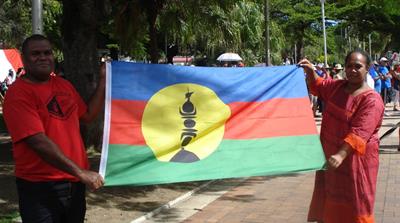
Canberra, Australia – The people of New Caledonia will vote on Sunday on whether they want full independence from France, which has ruled the small archipelago in the Pacific since the 19th century.
The islands, a nearly three-hour flight east of Australia, secured more autonomy amid growing calls for independence by the indigenous Kanak people in the 1980s.
When an estimated 174,000 voters who qualify as long-term residents head to the polls on Sunday, it will be the second referendum on New Caledonia’s political status. The first, held in 1987, was widely boycotted by the Kanaks, resulting in more than 98 percent electing to remain with France.
|
Macron: Reconciliation needed before New Caledonian referendum |
In the capital, Noumea, while campaigning has been keen, the mood remains calm.
“The public mood in Noumea is pretty quiet,” Catherine Ris, professor of economics at the University of New Caledonia, told Al Jazeera.
“Political parties and people involved in the parties are campaigning and excited to defend their opinions. There are lots of meetings, posters in the streets, and sheets of fabric printed with the red, blue and green of the Kanak and Socialist National Liberation Front (FLNKS) flag are hooked on trees on the roadsides all around the country.”
‘Shared sovereignty’
About 27 percent of New Caledonia’s population of 279,000 are of European, primarily of French descent, and 39 percent indigenous. The rest are migrants from other Pacific islands and the wider Asia-Pacific.
The 1998 Noumea Accord sought to create a shared vision of the territory’s future, but while people might agree with that vision, divisions remain between French loyalists intent on retaining the status quo, and a pro-independence movement equally committed to full self-determination.
It was the years of Kanak resistance to disenfranchisement and inequality that triggered talks between French and local leaders about reform. Kanaks were worried their customary land was being taken away from them and were angry at the French government’s encouragement of inward European migration, even as Kanaks struggled to get education and find work.
To appease the indigenous people and temper calls for independence, the French negotiated two major pacts.
The 1988 Matignon Accord was designed to bring more equitable development across New Caledonian society, while the Noumea Accord paved the way for increased autonomy based on an idea of “shared sovereignty”, recognition of Kanak identity and rights and the timetable for this year’s referendum.
No social justice
For New Caledonians in general the vote is about having more say in issues that directly affect their lives. For Kanaks, it represents the promise of decolonisation seven decades after it was first promoted in the post-World War II era.
New Caledonia is one of only 17 remaining non-self-governing territories around the world identified by the UN as yet to fully exercise its right to self-determination.
“In terms of economic development, there has been change,” said Bilo Railati, a young independence supporter of Kanak and Fijian heritage. “But we have not yet achieved social justice.”
 |
| The distinctive Kanak flag is a symbol of the pro-independence movement in New Caledonia [Catherine Wilson/Al Jazeera] |
Opinion polls conducted over the past two years suggest a victory for the pro-France side.
As many as 75 percent of all eligible voters oppose independence, a survey published by local research firm Quidnovi in September showed. But many Kanaks support independence for the island, which is renowned for its natural beauty but is also the location of one-quarter of the world’s known supplies of nickel.
The apparent opposition to independence is partly the result of policies encouraging people to move to the islands from France, which have made the indigenous people a minority. But there are also broad concerns across the entire electorate about the possible economic impact of going it alone, which would probably mean a decline in French funding of the government and public services.
French politicians have repeatedly emphasised the state is impartial in the referendum and will respect the outcome.
“It’s not for the head of state to take a position on a question that is only being put to the people of New Caledonia,” President Macron said in a speech during his first official visit in May.
But he went on to say: “France would not be the same without New Caledonia.”
For the French, New Caledonia is a strategic asset, supporting the country’s position as a global, maritime and military power.
Turnout important
It is also a base from which it can extend its geopolitical influence in the Asia Pacific, particularly through membership of regional organisations, such as the Pacific Islands Forum. And if it were to lose New Caledonia there is a worry overseas island territories, such as French Polynesia, might also start agitating to leave.
 |
| About 4,000 loyalists marched through the New Caledonian capital in May during a visit by French President Emmanuel Macron [Catherine Wilson/Al Jazeera] |
Voter turnout is expected to be high. For the independence movement, the key will be getting out the vote in rural areas, home to about 22 percent of the population and more than 70 percent of Kanaks.
But even if the territory votes “no” on Sunday, it won’t end the matter entirely. Under the terms of the Noumea Accord, there can be up to two more referenda on independence before 2021.
The French Prime Minister Edouard Philippe has already announced his intention to travel to the territory and hold meetings with local leaders soon after the vote is held. And both camps are expected to vigorously negotiate their interests in the aftermath of this weekend’s ballot.
“Whatever the results, the local political partners and the state will have to discuss the future of the country,” Romain Hmeun, editor in chief at the indigenous Radio Djiido station, said.
“The common destiny will have to be built with the Kanaks, not without them.”












